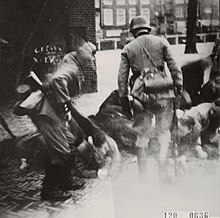You can help expand this article with text translated from the corresponding article in German. Click [show] for important translation instructions.
|


The February strike (Dutch: Februaristaking) of 1941 was a general strike in the Nazi-occupied Netherlands during World War II. It was organized by the outlawed Communist Party of the Netherlands in defence of persecuted Dutch Jews and against the anti-Jewish measures and the activities of Nazism in general.
The direct causes were a series of arrests and pogroms held by the Germans in the Jewish neighbourhood of Amsterdam, the Jodenbuurt. It started on 25 February 1941 and lasted for two days. On 26 February, 300,000 Amsterdam people joined the strike. The strike was harshly suppressed by the Germans after three days.[1]
Although the February strike is considered to be the first public protest against the Nazis in occupied Europe,[2] it was quickly suppressed. There was no major citizen action public action after the top Nazi official, Reichskommissar Seyss-Inquart, warned the Dutch public that there would be draconian consequences.[3] There was a smaller public action against the deportation of Jews to be organized by non-Jews in Berlin, known as the Rosenstrasse protest.[4]
- ^ Amsterdam, USHMM
- ^ 1941: The Dutch Strike Against Nazi Abuses of Jews, Haaretz
- ^ Romijn, Peter, "The Experience of the Jews in the Netherlands During the Nazi Occupation" in Dutch Jewry: Its History and Secular Culture, 1500-2000. Leiden: Brill 2002, 260-61.
- ^ Amsterdam marks anniversary of 1941 mass strike in support of Jews, World Jewish Congress